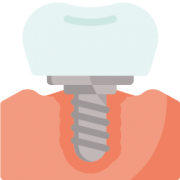This dental replacement treatment consists of two phases.
After a circumspect assessment of needs and state, and preparing the treatment plan the first step is inserting the dental implants. Due to modern local anaesthesia, the intervention is virtually painless, but we provide the possibility of general anaesthesia. Depending on the occasional tooth extractions and the number of implants the intervention can be finished in ten minutes (in the case of full denture reconstruction, it lasts about two hours). Our specialist extracts the dead teeth and immediately inserts the dental implants. If needed, bone grafting is done during this procedure. As it is about a dynamically advancing surgical procedure, today a standard dental implant intervention is minimally invasive, which means that it doesn’t leave wounds, therefore it doesn’t result in a prolonged and unpleasant wound healing.
After a couple of days of wound healing the implants keep ossifying below the healed gums. Depending on the particular case, a temporary replacement is made. If you have a detachable denture that you want to replace, you can wear it during the healing period as a temporary replacement. In this case you can return home after the check-up, a day after the surgery. If a temporary replacement is required for the healing period, our dental technician can prepare it in three days, and after delivery you can return home.
In the following three months or so the osseointegration of the implants take place, meaning that the jawbone grows around the dental implant’s specially designed surface. As a result, the implant behaves as the root of natural teeth: it is fixed in the mandible or maxilla ready to hold the crowns. This process takes place invisibly and unnoticed under the gums, it doesn’t affect eating or anything else in the everyday routine.




